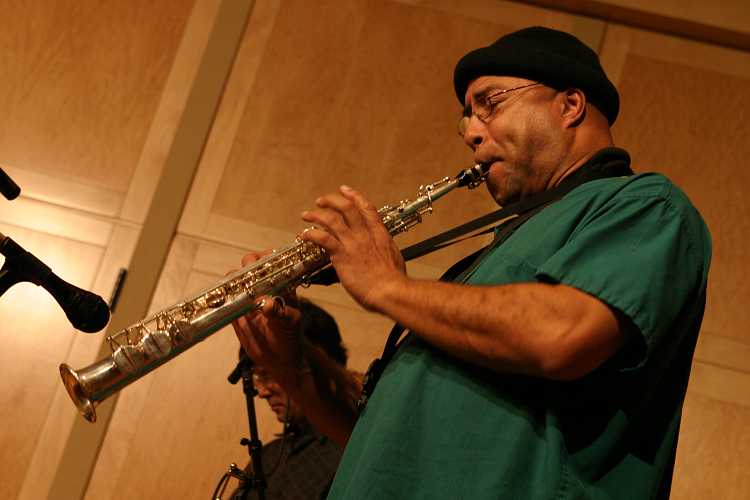You were playing with your musical soul-mate trombonist Vincent Chandler. This was years before you guys formed the jazz quintet Urban Transport. (It saddened me when I heard you quit the band.) You were its heart and soul. Thaddeus Dixon, an up and coming drummer replaced you. But Urban Transport, in my opinion, was never the same. You bounced back quickly, forming Sean Dobbins and the New Jazz Messengers. I've heard great things about the group.
At the C Pop, you played as if you’re blessed by the spirits of drummers Art Blakey and Big Sid Catlett. Mr. Dobbins, I was blown away by your every lick and rim shot. I kid you not; I never thought you could top that performance. To my surprise, you did on October 14, 2007, at Bert’s Market Place as a participant of master drummer George Davidson’s “Drum Summit”.
You turned the place out, standing toe to toe with drummers Bert Myrick, Bill Higgins, and Spider Webb. You took their best shots. There was one moment when I became concerned.
Spider had you cornered, entangled in his web of notes on trumpeter Donald Byrd’s gem “Fly Little, Bird Fly”. You had a sturdy chin. You swung your way out. When the tune was over, Spider and the others were slumped over their drum kits. You stood victorious with smoke emanated from your drumsticks.
I have witness you many times before. For example, last summer you worked behind bassist Hakim Jami and saxophonist Salim Washington at the Jazz and Improvised Music Festival. At that gig, you demonstrated you could play with the free-jazz cats, too .
The energy, the animation, and the technical sophistication you displayed at the C Pop Gallery and the “Drum Summit” will stick to my ribs forever. I’m not pulling your leg.

 Bassist Marion Hayden’s employs trombonist Steve Turre, trumpeter Cecil Bridgewater, and pianist Kirk Lightsey for "Visions" her debut recording as a leader. Regardless of the musical context or configuration, the bassist normally makes her presence known. She has done so as the driving force of the quintet Straight Ahead, and as the leader of an all bass ensemble. However, "Visions" isn't the coming out party for Hayden it ought to be. The album feels like a showcase session for Turre, Bridgewater, and Lightsey. Lightsey could easily be mistaken as the leader because the pianist has the strongest presence, especially on "Mr. Kenyatta" and "Destiny". Hayden solos nicely on "Sumpin Like Dat" and "Perhaps". On other selections, she just performs the duties of a sideman/woman. It's as if she in awe of the veteran jazz guys, and she's scare to assert herself. The downside of employing Turre, Bridgewater, and Lightsey on this debut is they overshadow her.
Bassist Marion Hayden’s employs trombonist Steve Turre, trumpeter Cecil Bridgewater, and pianist Kirk Lightsey for "Visions" her debut recording as a leader. Regardless of the musical context or configuration, the bassist normally makes her presence known. She has done so as the driving force of the quintet Straight Ahead, and as the leader of an all bass ensemble. However, "Visions" isn't the coming out party for Hayden it ought to be. The album feels like a showcase session for Turre, Bridgewater, and Lightsey. Lightsey could easily be mistaken as the leader because the pianist has the strongest presence, especially on "Mr. Kenyatta" and "Destiny". Hayden solos nicely on "Sumpin Like Dat" and "Perhaps". On other selections, she just performs the duties of a sideman/woman. It's as if she in awe of the veteran jazz guys, and she's scare to assert herself. The downside of employing Turre, Bridgewater, and Lightsey on this debut is they overshadow her.


